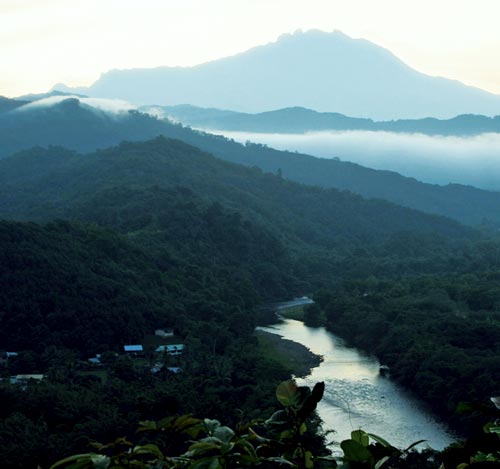Full circle
My eyes were red and stinging with the salt water. Outside the little cocoon formed by our torch we could see nothing. The wind started to pick up again. We were once again being tossed this way and that. Neither Tundah nor I could have the remotest idea of the direction we were travelling.
Suddenly Tundah shouted in my ear. “Awas (danger), Tuan.” He pointed with his torch. Straight ahead of us was the black post of a kelong. I pushed the throttles full open almost instinctively and spun the wheel. “Jump!” I shouted, “grab the kelong.”
It was too late. The Pekaka’s stern spun round. We caught a glancing blow along our side. We surged forward on the next wave, and the kelong disappeared in the darkness behind us. In the light of Tundah’s torch I saw that we were diving at full speed into a huge green wall of water.
I pulled savagely back on the throttles to slow us down. It had no effect. The Pekaka dived deep into the wave. As it hit us, I pushed the throttles full open again, clinging tightly to the steering wheel with one hand. The throttle probably saved us. There was a thunderous crash as tons of water landed on us. The windscreen took the brunt of the blow.
After an agonising second, the powerful 60hp Mercury engines drove us forward and upwards and the Pekaka shook herself free of the wave. I eased the throttle back again. Half the windscreen was hanging off. Tundah’s torch had disappeared. With the next flash of lightning, I could see that both Tundah and Ah Chang were mercifully, still in the boat. We must now be very close to the end however. The wind was increasing to its former fury. We were travelling in complete darkness except for the lightning flashes.
Without the protection of the windscreen, if we went under again, we would not come up. Needless to say, we had no buoyancy tanks. The Sandakan harbour-master had warned us that the Pekaka was unsuitable for anything but river travel. It was now half-full of water, but strangely it seemed to handle better. It lurched drunkenly, and wallowed in the troughs, but it no longer tried to bury itself in the oncoming waves.
The danger now was that we would founder. I heard Tundah shouting in the darkness to Ah Chang to help him to bale but there was no reply. Tundah applied himself frantically to scooping water over the side.
Suddenly he stopped baling and grabbed my arm. “Look Tuan, over to the right,” he shouted in my ear. I could see a dim point of light. I was puzzled. It looked something like a firefly. It jumped around, up and down and from side to side.
“Kulapis,” Tundah shouted. I gradually eased the sluggish Pekaka round to head directly for the light.
It was not Kulapis. As we got closer we realised that it was the stern light of a large 50-ton kumpit. It was at anchor, but it was being flung around on the waves like a toy. We approached it cautiously in case we were dashed against its side. We hailed it from a distance of about 10 feet.
A startled Chinese face appeared above us from a cabin in the stern. He peered at us disbelievingly. Appearing as we did in the darkness, out of the sea, in the teeth of the storm, in our tiny speed-boat, we must have come as something of a shock to him.
“Where are we?” I shouted.
“Gum Gum,” he replied.
“Where?” I asked.
He looked at us stupidly. “Gum Gum lah!” he shouted again.
“Mana? (Where is the Gum Gum River?)” I shouted back.
“Sini,” he said and pointed to the other side of his kumpit.
A few more yards in the Pekaka and we realised that we were indeed in the Gum Gum estuary or as close to it as a large kumpit could risk anchoring. A hundred yards or so further in the direction he had indicated, the waves died away. We had reached the safety of the creek.
The wind dropped and the clouds parted. A huge moon appeared above the mangroves which lined the creek. We tied up to a branch and took stock of our position. There was still, in spite of Tundah’s energetic efforts with the baler, about a foot of water slurping around in the bottom of the boat.
Ah Chang sat in it as if he was taking a bath. His face was white and he looked ghastly in his bedraggled white uniform. He was still clinging on tightly to the side of the boat with both hands in a state approaching cataleptic shock. His umbrella had gone, as had the cane chairs and most of our provisions. The Pekaka had a gash down its side where we had grazed the kelong. Tundah looked at me and laughed.
Suddenly the flow of adrenalin ebbed. I was overcome with an immense weariness. I lay down across the length of the wooden bench in my sodden clothes and fell into a deep slumber. It was the first real sleep I had had for nearly 40 hours.
I was awakened by Tundah shaking me by the shoulder. We were back at the Gum Gum jetty. The three of us trudged silently in single file, dripping wet, down the moonlight track to the main road. It was distinctly chill in our wet clothes.



